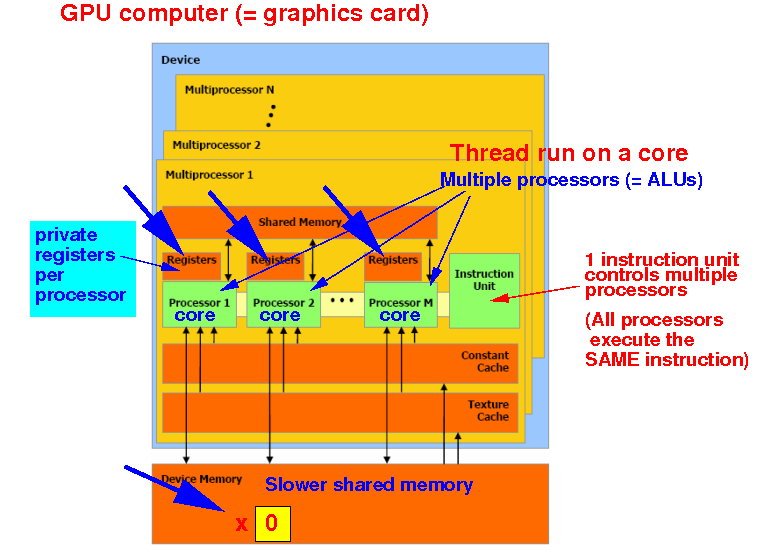|
Recall the Hello World CUDA program:
#include <stdio.h> // C programming header file
#include <unistd.h> // C programming header file
/* ------------------------------------
Your first kernel (= GPU function)
------------------------------------ */
__global__ void hello( )
{
printf("Hello World !\n"); // You see this msg 4 times...
}
int main()
{
hello<<< 1, 4 >>>( ); // launch kernel
cudaDeviceSynchronize();
printf("I am the CPU: Hello World ! \n");
}
|
For our demo, I will rename the kernel function to: addOne( )
__global__ void addOne( ) { printf("Hello World !\n"); } int main() { addOne<<< 1, 4 >>>( ); // launch kernel cudaDeviceSynchronize(); printf("I am the CPU: Hello World ! \n"); } |
The addOne( ) function will add 1 to the same variable x...
We create a shared variable x between the CPU and GPU:
__managed__ int x; __global__ void addOne( ) { printf("Hello World !\n"); } int main() { addOne<<< 1, 4 >>>( ); // launch kernel cudaDeviceSynchronize(); printf("I am the CPU: Hello World ! \n"); } |
Initialize the shared variable x to 0 (zero):
__managed__ int x; __global__ void addOne( ) { printf("Hello World !\n"); } int main() { x = 0; addOne<<< 1, 4 >>>( ); // launch kernel cudaDeviceSynchronize(); printf("I am the CPU: Hello World ! \n"); } |
The GPU function Make addOne( ) will add 1 to its x (and print a message on what it did):
__managed__ int x; __global__ void addOne( ) { printf("Thread %d: Adding 1 to x\n", threadIdx.x); x = x + 1; } int main() { x = 0; addOne<<< 1, 4 >>>( ); // launch kernel cudaDeviceSynchronize(); printf("Main after addOne(): x = %d\n", x\n"); } |
DEMO: /home/cs355001/demo/CUDA/5-add-common-var/add-common1.cu
Output of the demo program:
cs355@ghost01 (841)> add-common1
Main before addOne(): x = 0
Thread 0: Adding 1 to x
Thread 1: Adding 1 to x
Thread 2: Adding 1 to x
Thread 3: Adding 1 to x
Main after addOne(): x = 1
|
In other words: the 4 threads has each performed x = x + 1 once
We expected that x is increased by 4 !!!
However, x is increased by 1 only !!!
Explanation of this inconsistent behavior:
|
Explanation of this inconsistent behavior --- recall that:

Threads executes on CUDA cores and each core has its own registers !!!
Explanation of this inconsistent behavior
Let's execute the GPU program using 2 (simultaneously running) threads:
2 threads executes: x = x + 1 Initially: x = 0 Thread 1 Thread 2 ============ =========== ldr R0,x ldr R0,x add R0,R0,#1 add R0,R0,#1 str R0,x str R0,x |
Explanation of this inconsistent behavior
Let's execute the GPU program using 2 (simultaneously running) threads:
2 threads executes: x = x + 1 Initially: x = 0 Thread 1 Thread 2 ============ =========== ldr R0,x (Thr 1's R0 = 0) ldr R0,x (Thr 2's R0 = 0) add R0,R0,#1 add R0,R0,#1 str R0,x str R0,x |
Notice that both thread will set: R0 = 0 !!!
Explanation of this inconsistent behavior
Let's execute the GPU program using 2 (simultaneously running) threads:
2 threads executes: x = x + 1 Initially: x = 0 Thread 1 Thread 2 ============ =========== ldr R0,x (Thr 1's R0 = 0) ldr R0,x (Thr 2's R0 = 0) add R0,R0,#1 (Thr 1's R0 = 1) add R0,R0,#1 (Thr 2's R0 = 1) str R0,x (Thr 1 set x= 1) str R0,x (Thr 2 set x= 1) |
Notice that both thread will increase R0 to 1 !!!
Explanation of this inconsistent behavior
Let's execute the GPU program using 2 (simultaneously running) threads:
2 threads executes: x = x + 1 Initially: x = 0 Thread 1 Thread 2 ============ =========== ldr R0,x (Thr 1's R0 = 0) ldr R0,x (Thr 2's R0 = 0) add R0,R0,#1 (Thr 1's R0 = 1) add R0,R0,#1 (Thr 2's R0 = 1) str R0,x (Thr 1 set x= 1) str R0,x (Thr 2 set x= 1) |
Notice that both thread will update x to 1 !!!
Therefore: unsynchronized simultaneous updates to the same variable results in "missing" updates
|
Consider the previous CUDA program where 4 threads simultaneously add 1 to the var x:
__managed__ int x; __global__ void addOne( ) { printf("Thread %d: Adding 1 to x\n", threadIdx.x); x = x + 1; } int main() { x = 0; addOne<<< 1, 4 >>>( ); // launch kernel cudaDeviceSynchronize(); printf("Main after addOne(): x = %d\n", x\n"); } |
We change it to use atomicAdd(x, 1) to add 1 atomically:
__managed__ int x; __global__ void addOne( ) { printf("Thread %d: Adding 1 to x\n", threadIdx.x); atomicAdd(&x, 1); } int main() { x = 0; addOne<<< 1, 4 >>>( ); // launch kernel cudaDeviceSynchronize(); printf("Main after addOne(): x = %d\n", x\n"); } |
DEMO: /home/cs355001/demo/CUDA/5-add-common-var/add-common2.cu
Output of the demo program:
cs355@ghost01 (841)> add-common2
Main before addOne(): x = 0
Thread 0: Adding 1 to x
Thread 1: Adding 1 to x
Thread 2: Adding 1 to x
Thread 3: Adding 1 to x
Main after addOne(): x = 4
|
In other words: the 4 threads has each performed x = x + 1 once
We expected that x is increased by 4 !!!
It is now correct !!!